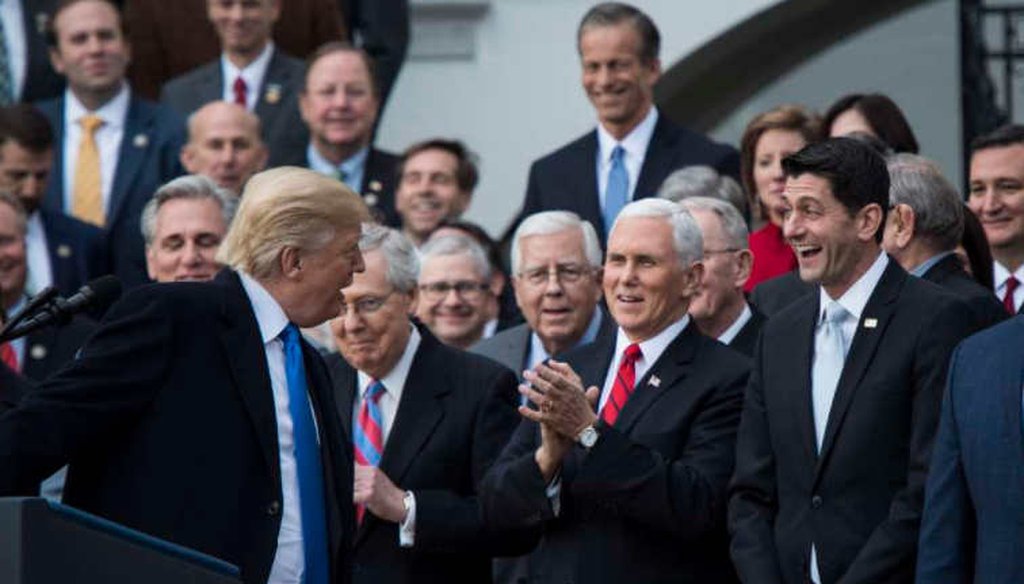Get PolitiFact in your inbox.
Mandate rollback not a repeal of Obamacare, but it may undermine it

President Donald Trump and House Speaker Paul Ryan celebrate passage of major tax legislation at a White House event. (Washington Post photo by Matt McClain)
The Republicans' successful drive to pass a massive tax bill allowed President Donald Trump to take another slice off of the Affordable Care Act. Effective 2019, the sweeping tax package repeals the penalty on people who might be able to afford health insurance but choose not to buy it. The individual mandate affects a relatively narrow sliver of Americans, but it has been a pillar of Obamacare.
The mandate was the stick to herd more people -- healthy people -- into the insurance pool. That would spread the risk, keep premiums down and produce a stable insurance market.
Fundamentally, it was the evil twin of a very popular feature of the health care law -- guaranteed coverage of people with pre-existing conditions. The deal was that if the government is going to force insurance companies to cover everyone, then it must deliver a big insurance pool with a lot of people who won't rack up medical bills. The mandate plays a similar role with the Affordable Care Act's community rating rules, which prevent the insurance companies from charging sick people more than healthy people.
Last year, about 6.5 million households paid the penalty (although many who did probably could have avoided it). In a Nov. 13 tweet, Trump called the mandate unfair and highly unpopular and urged the Senate to add repeal to its tax package. Trump got what he wanted.
Eliminating it does no favors for Obamacare's goal to get more people covered at a price they can afford.
The American Academy of Actuaries, the ultimate mavens of risk for the insurance industry, told lawmakers that if they simply got rid of the mandate and did nothing else, fewer healthy people would buy policies. "Premiums would increase as a result, reducing affordability and eroding pre-existing condition protections," said the academy's Shari Westerfield.
The Congressional Budget Office, the nonpartisan number crunchers for Congress, estimated that premiums would rise 10 percent. After 10 years, 13 million fewer people would be insured.
But even the CBO stressed how mushy any prediction is, noting that the actual impacts "would probably be smaller than the numbers reported in this document."
Larry Levitt at the Kaiser Family Foundation, a neutral source of health care data, said his sense is that at the end of the day, setting the mandate penalty to zero, which is what the tax law does, "will hobble the ACA, but not kill it."
"The heart of the ACA – the premium subsidies, the Medicaid expansion, and protections for pre-existing conditions – remain in place," he said. "The premium subsidies should provide enough of an incentive for many healthy people to get coverage to keep the individual market reasonably stable."
We reached out to other health care policy experts. Christine Eibner at the RAND Corporation emphasized that the effect of repeal is "highly uncertain."
Still, she told us that "on balance, I think the evidence suggests that the mandate is having some impact on enrollment, but it may be small relative to other factors such as the tax credits and subsidies."
"We don't really know," said Martin Gaynor, economist at Carnegie Mellon University. "If the mandate is important, then eliminating it will create big problems in the exchange marketplaces, which would likely prove difficult to reverse."
With this change, Trump continues to undermine the Affordable Care Act rather than replace it. He hasn't repealed the law officially, and we'll have to monitor how much repealing the mandate affects the Affordable Health Care Act's overall goals. Our rating for this promise remains as before, In the Works.
Our Sources
IRS, Letter from IRS Commissioner John Koskinen to Congress, Jan. 9, 2017
Kaiser Family Foundation, How Many of the Uninsured Can Purchase a Marketplace Plan for Less Than Their Shared Responsibility Penalty?, Nov. 9, 2017
Brookings, Repealing the individual mandate would do substantial harm, Nov. 21, 2017
American Academy of Actuaries, Potential Adverse Consequences of Eliminating the Affordable Care Act's Individual Mandate, Dec. 12, 2017
New England Journal of Medicine, The Importance of the Individual Mandate — Evidence from Massachusetts, Jan. 27, 2011
U.S. House of Representatives, Text: Tax Cuts and Jobs Act, Dec. 14, 2017
Journal of Health Economics, Premium subsidies, the mandate, and Medicaid expansion: Coverage effects of the Affordable Care Act, March 6, 2017
Congressional Budget Office, Repealing the Individual Health Insurance Mandate: An Updated Estimate, November 2017
Axios, The ACA stability "crisis" in perspective, Aug. 10, 2017
Email interview, Martin Gaynor, professor of economics and health policy, Carnegie Mellon University, Dec. 19, 2017
Email interview, Larry Levitt, senior vice president, Kaiser Family Foundation, Dec. 19, 2017
Email interview, Christine Eibner, senior economist, RAND Corp.,Dec. 19, 2017
